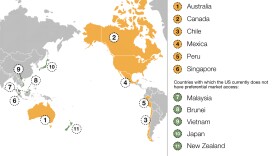By Richard Nelson
http://stream.publicbroadcasting.net/production/mp3/wkms/local-wkms-840196.mp3
Murray, KY – Earlier this month, Kentucky Governor Steve Beshear and Democratic House leaders discussed legislation that would allow video gambling at racetracks to boost the state's ailing horse industry. The meeting came just days after Churchill Downs cut race days and decreased purses, citing financial trouble. House Speaker Greg Stumbo says the plan to allow the machines at Commonwealth race tracks would generate additional money for larger purses and could bring the state up to 350 million dollars when fully operational. Commentator Richard Nelson believes this plan only lines the pockets of wealthy business owners at the expense of the majority of Kentuckians and he says gambling our way out of a recession is no way to run a government.
Two seemingly unrelated stories by the Asssociated Press were widely circulated recently in Kentucky newspapers. One reported about the decline in state revenue, which could lead to a possible $1 billion budget shortfall in 2010. The other reported a gathering of horse track owners who say they won't survive without expanded gambling. The operative words are "seemingly unrelated," because something is brewing in Frankfort.
Call it the perfect storm.
According to story number one, the Department of Revenue received $113 million less this past April than the same month last year. It's no surprise that when the economy is troubled, businesses close and tax revenue dries up.
Now for story number two. Owners of Kentucky's horse parks say stiff competition from tracks in other states that have casino gambling makes legalizing slots their only alternative to be competitive.
Or so they say.
Let's see . . . the economy is suffering. Kentucky's signature industry at a disadvantage because of an unfair playing field. A state legislature looking for new revenue sources. Add it up and it equals expanded casino-style gambling.
I may be jumping the gun, but I don't think so. Aggressively working behind the scenes for casino expansion are House Speaker Greg Stumbo and Governor Beshear. So is the Kentucky Equine Education Project. There's even talk of a special session this summer.
The first question to ask is why Churchill (or any horse track) deserves special treatment in this tough economy. Just about every business is hurting, including the largest employer in my home county, Johnson Controls, which recently closed its doors to 600 workers and left the county with a 15 percent unemployment rate. According to the Kentucky Cabinet for Economic Development, 83 businesses shut down in Kentucky between Jan. 2008 and April 2009. Some 5423 full time jobs were lost. Businesses are clearly hurting, but without exception, only wealthy horsemen are lining up for bailouts and political favors in the form of legalized slots these days.
Then again, the wealthy horse lobby has a history in political schmooze, going back in recent memory to BOPROT. Remember when 21 legislators and lobbyists were indicted for soliciting and receiving bribes to pass legislation favorable to the tracks? Several people went to jail (including then-sitting House Speaker Don Blandford) in the early 1990 s for their part. In 2005, evidence of corruption emerged a year after the Kentucky Racing Commission was disbanded. If it seems like big gambling has a bad track record, it s because big gambling does have a bad track record.
At the beginning of the 2002 General Assembly, Churchill Downs sent hefty campaign contributions to Kentucky legislators. Not quite illegal, but it didn't pass the smell test, so several legislators returned the money. Their latest maneuver occurred just prior to the Kentucky Derby when they threatened to move Kentucky's premier event if they don't get slots.
Just to be clear, Churchill Downs is a multi-million dollar conglomerate; second largest simulcaster in the nation; owns several subsidiary companies and trades for nearly $40 per share on NASDAQ; And an estimated 95 percent of it is owned by people outside Kentucky.
Loyalties you ask?
Churchill Downs has become an organization that is not so much about horses as it is about money. Slots are a good idea if you own the business. They're bad for everyone else, including horse racing enthusiasts. Slot machines act as a black hole to local economies, sucking discretionary dollars from the community and leading to compulsive and addictive behavior for many patrons. As for the horse tracks that have slots, yes, there are bigger purses, but race attendance drops. All the action is in the casino portion. Horses simply become overhead.
The economy is still suffering and tax revenues continue to drop, but it's a mistake for the legislature to gamble our way out of this recession. Even if the proposal is good for a few wealthy horsemen, the fact is that too many Kentuckians will lose in the end.




